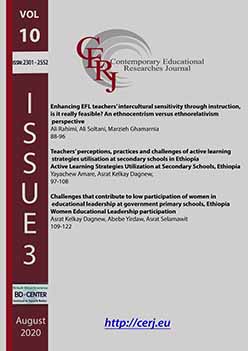Enhancing EFL teachers’ intercultural sensitivity through instruction, is it really feasible? An ethnocentrism versus ethnorelativism perspective
Enhancing EFL teachers’ intercultural sensitivity through instruction, is it really feasible? An ethnocentrism versus
ethnorelativism perspective
Author(s): Ali Rahimi, Ali Soltani, Marzieh GhamarniaSubject(s): Education
Published by: Birlesik Dunya Yenilik Arastirma ve Yayincilik Merkezi
Keywords: EFL; ethnocentrism; ethno relativism; intercultural sensitivity;
Summary/Abstract: It is simplistic to believe that second language learning can be accomplished without proper acquisition of the second language culture. This study aimed at investigating the feasibility of promoting Iranian EFL teachers’ intercultural sensitivity through training. To do so, 35 teachers, who proved to be homogenous, were randomly selected from among 45 teachers after the administration of the general language proficiency test TOEFL. Afterwards, Chen and Starosta’s Intercultural Sensitivity Scale was completed by the participants. They were then required to take the intercultural sensitivity training course for a semester. The same scale was completed by them at the end of the semester. A pre-test and a post-test were also administered. The results of the t-test run indicated a notable enhancement in the level of Iranian EFL teachers’ intercultural sensitivity. The findings could have some important implications for all stakeholders who are open-mindedly inclined to acknowledge the unavoidable, although neglected, role played by culture as the inseparable component of modern language education which can effectively trigger a movement away from ethnocentric stages towards ethno relative stages.
Journal: Contemporary Educational Research Journal
- Issue Year: 10/2020
- Issue No: 3
- Page Range: 88-97
- Page Count: 10
- Language: English

